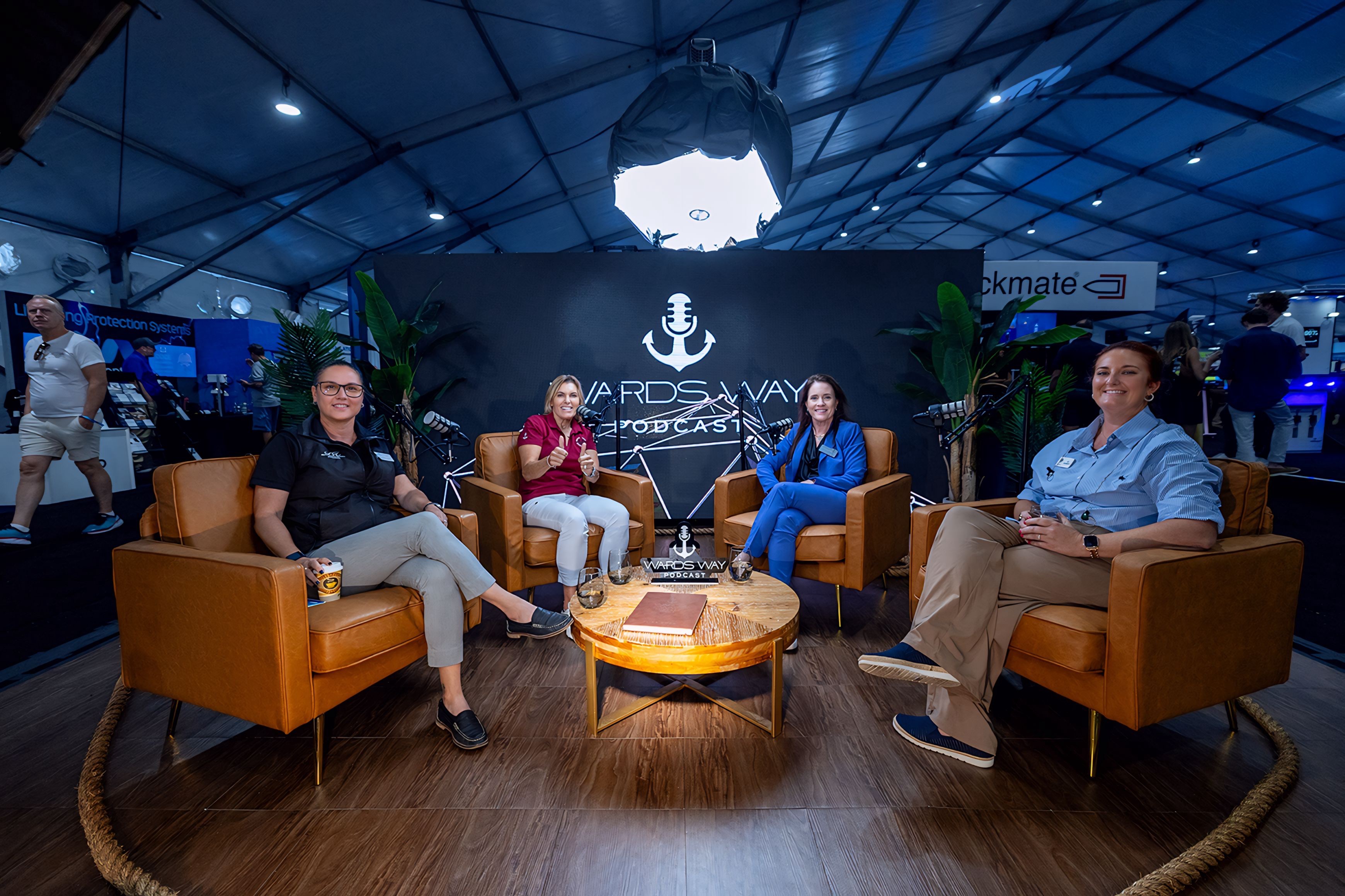
The Future of Boating Starts Here: Season 5, Episode 2 with Captain Sandy Yawn, Liz Schmidt, and Lori Wheeler
Season 5, Episode 2 of the Wards Way podcast features a live discussion from the Fort Lauderdale International Boat Show. Host Kristina Hebert engages with Captain Sandy Yawn, a prominent figure in maritime operations, Liz Schmidt, the executive director of Captain Sandy's Charities, and Lori Wheeler, vice president of the Marine Association of South Florida.
A thriving marine economy does not happen by accident; it grows from practical training, smart funding, and laws that match reality on the water. Kristina Hebert and her panel of experts explore how local pride, global talent, and methodical education can shape the next era of American yachting. Hebert and guests map a path that starts with a classroom and ends with a robust charter market on the U.S. East Coast. The core idea is simple: if kids can see marine careers early and often, they will be more likely to choose them. Add a funding engine and targeted policy reform, and the pipeline widens from shore-based trades to yacht crew and beyond.
Education sits at the heart of the plan. Captain Sandy’s Charities offers a fully accredited Florida Department of Education curriculum at no cost to teachers, introducing middle and elementary school students to fundamental maritime roles. It demystifies work on vessels and shoreside jobs across various disciplines, including electrical, carpentry, welding, logistics, hospitality, and operations. Students learn foundational seamanship and discover how transferable skills connect to high-demand trades. The approach mirrors proven media efforts like Salty Jobs and the new Beyond the Docks series, which showcase day-in-the-life tasks and the competencies required. By normalizing marine careers in public schools, the program addresses awareness barriers that kept many adults from ever considering crew life or technical roles.
Funding turns intent into scale. The “Boating Plate” specialty license tag channels proceeds directly into maritime education and training. The goal is clear: to reach 3,000 registrations, deploy funds for curriculum expansion, teacher support, and eventually offer scholarships for industry certifications at institutions like Maritime Professional Training and Atlantic Technical College's apprenticeship programs. Companies can outfit their fleets with the plate to amplify impact and signal sector pride. This is low-friction, high-visibility fundraising that compounds benefits: more classrooms are engaged, more students are exposed to STEM-rich trades, and more entry points are created into an industry with strong wages for skilled workers.
The conversation navigates the challenging transition between sea and shore. Crew members develop elite competencies—logistics, service at ultra-high standards, safety, systems thinking, and meticulous organization—that should translate to land-based roles in sales, operations, events, and technical service. Yet many get stuck on salary expectations and uncertainty about next steps. The hosts advocate for creative incentives, certifications, and mentorships to facilitate smoother transitions. Apprenticeships offer a proven ladder. Employers can widen their lens by recruiting former crew members as operations leaders who already understand client experience, downtime risk, and the cadence of maintenance. This closes a growing skills gap in an aging workforce while honoring the discipline learned at sea.
Policy reform is the force multiplier. Current Jones Act and coastwise rules limit U.S.-flag chartering with foreign crew, pushing yachts to the Med and Caribbean. The proposed roadmap would allow a multinational crew mix on U.S.-flag yachts, consider a 50-50 crew cap, and tie the change to a 12-year sunset, aligned with the K–12 education cycle. The logic is pragmatic. Open the market now to spur charters, refit work, provisioning, and yard growth along the East Coast, while the curriculum generates a rising cohort of American mariners. Revisit the policy at sunset; if the domestic talent pool is strong, recalibrate. This approach invites collaboration with commercial shipping to ensure carve-outs target yachting and protect broader labor interests.
Imagine the upside. A revitalized charter corridor from South Florida through the Carolinas, Chesapeake, New York, New England, and up to Maine would fuel local economies with fuel purchases, dockage, maintenance, and hospitality spending. It would justify new yard investments, modernize waterfront uses, and strengthen American boatbuilding through steady demand. Pair that with sustainability woven into the curriculum—from resource stewardship to waste reduction—and the sector prepares responsible professionals who treat vessels like floating micro-cities. The plan is not nostalgia; it’s a blueprint designed for resilience. With education, funding, and modern rules, the U.S. can grow talent, retain vessels, and keep the magic of working on the water within reach for the next generation.
We invite you to explore the complete episode, available on your preferred streaming service by searching for "Wards Way." Be sure to subscribe for updates!
For further insights into Captain Sandy and her philanthropic initiatives, please follow this link: https://captainsandyscharities.org/

